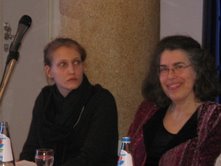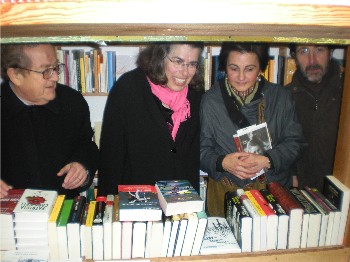Want a Book Tour? Go to Italy
By Helen Epstein, World Books contributor
Last month I was invited to Italy where a university press published my family and social history of Central European Jewish women “Where She Came From.” For 12 days, I traveled from Rome to Trieste to Udine to Milan then Perugia on a book tour, trying to understand why a small provincial Italian publishing house could take for granted something that major American houses no longer do.
In 1979, when I published my first book, there were many literary journals, many newspapers with book review sections and only about 40,000 new titles. Today, there are 480,000. Thirty years ago the internet and conglomerization had not yet transformed publishing; neither the print media nor independent bookstores were yet in their death throes. Today, of course, all this makes an author want to slit her throat.
So whenever a book of mine gets published in translation, I get on an airplane to re-experience what used to be normative: meeting an editor who shepherds a book from manuscript into the bookstore; thanking independent booksellers who hand-sell to readers; speaking with journalists who’ve not only read but marked-up my book, filled it with post-its, and ask questions that actually make me think.
Case in Point: Italy
Background: a couple of years ago, a Professor Annalisa Cosentino of the University of Udine, emailed me to say she had read “Where She Came From” in Czech and thought it would fit nicely into OLTRE, her series on Central European literature in Italian. Would I sell her the rights? Sure. I sold the rights to Forum Editrice for E700. No university press, I thought, would have the resources to do more than produce a mediocre translation and put it out in the market to die a quick death.
But, I had forgotten what a committed and innovative editor can do with a very little bit of money. Professor Cosentino teaches full-time at the University of Udine, translates (she’s now translating a new version of Hasek’s “Good Soldier Schweik” for a commercial press), and organizes exhibits in her spare time. Her large exhibit of documents and art works titled Da una primavera all’altra 1968-1969 is currently up in Rome’s Palazzo delle Esposizioni.

Me and intrepid translator Elisa Renso
Udine is a university town not far from the Slovenian border, with a tradition of respect for the academy and the arts. Its Mayor is a former university Provost and Professor Luigi Reitani, who co-edits OLTRE, serves as the municipality’s Cultural Councilor. He and Professor Cosentino acquired my book with a grant from the European Union to encourage the translation of literature from or about “smaller” EU countries such as the Czech Republic. She assigned the translation to a gifted student as a thesis project – a move that allowed her to combine teaching and editing, as well as receive additional funding from the university. The student, Elisa Renso, traveled with us as interpreter. The municipality of Udine and private citizens were solicited to help underwrite costs.
The national publishing picture for Italy is still quite different from that of the U.S. although it is rapidly moving in our direction. According to the latest stats from Associazione Italiana Editori, about 38,000 new titles were published in 2007, 20% of them translations. The number of serious readers is declining: only 3.2 million Italians read at least one book per month. Thought most major publishers have been bought up by conglomerates most of Italy’s 2,000 bookstores remain independent: only 609 belong to a chain.
That makes book promotion more of a personal and local issue, and depends on how innovative publisher and author can be. My publisher decided to tie promotion of “Di madre in figlia and Praga” to the Giorni della Memoria, the Days of Memory that are now celebrated throughout Italy as a result of a law passed five years ago to commemorate the Holocaust. The Municipality of Udine arranged for me to speak with 500 high school students in one of its theaters. Oddly enough the Pope added a newspeg that day by rehabilitating a Bishop who questioned the existence of the gas chambers where one set of my grandparents died. When a student asked how I reacted to this, I replied that the perhaps Pope needed to read more and participate along with them in a Day of Memory.
I gave readings for university students, an organization of psychoanalysts, and a Jewish Center in Rome, and for an event co-sponsored by a bookstore and proactive high school lit teacher in Perugia. But the most unusual venture took place at Milan’s National Chamber of Fashion. It was organized and underwritten by an Udine silk manufacturer, a reader, whom Forum Editrice had approached to help out with expenses since my book involved three generations of dressmakers. As I surveyed the roomful of expensively and elegantly-dressed attendees and heard my book discussed in Italian by the debonair male officers of the chamber, it occurred to me that American publishers might rethink their conventional templates for promotion and learn from the Italians.
Their belief in the importance of translation as well as their innovative approach to looking for what they call “publishing partners” seemed brilliant to me. Not to speak of the beautiful book they produced.
Tagged: Books, Culture Vulture, Featured, Forum-Editrice, OLTRE


Thanks, Helen, for such an informative and interesting post on book promotion in Italy. I love that the literarti partnered with the fashionistas!
what a whirlwind tour…. methinks these days are gone forever in much of the world…. sounds like you were in a time warp…how nice.
Years ago an author friend raved about how well he was treated in Germany when translations of his books appeared and he went on tour. I’m a son of Holocaust survivors and all I could think at the time was, “Good for you–I would never go.” But a lot changed for me in the intervening years and by the time Parthas Verlag in Berlin bought three of my books for translation, I was ready. The two book tours I had there were thrilling. It was wonderful to be treated as an artist, not a commodity, whether I spoke at a Jewish Museum, a book store, a library, a university. As tiring as the touring was (and it’s always tiring wherever), it filled me up and gave me a new book: My Germany. It’s just been published in the U.S. by the University of Wisconsin Press a(http://www.wisc.edu/wisconsinpress/books/4512.htm) and will appear in Germany next September. My wish for every author is to have the kind of experiences Helen had in Italy, and I’ve had in Germany.
Helen is such a thoughtful and intelligent person. Thank you for the years of insights Helen!
This perspective on the good and necessary association between a mécène, a local network and a writer being published, reminds me of what is happening for the edition of classical music: internet and the developpement of dowloading make it necessary to find similar associations to publish new interpreters of classical music.
This is fascinating! The Italian Fashion world fearing the loss of it’s own power identifies with the great tragedy of the Jewish people. Italian Jews started as rug dealers in the Roman Ghetto and later played an important part in the textile and fashion industry. The new financial reality of “from riches to rugs” might be the core of the interest. As a fashion designer who lived in Rome for nine years I can see coming. I also see it as a positive change to what was a rude indifference. The symbiotic relationship between esthetic and death is the theme of my current art installation. And who better than you Helen could inspire it. Thank you for sharing it.
Friends of mine who have done music tours in Europe say much the same thing. Apparently, when you book a tour in Europe, people come out to the shows, and actually act grateful that you’ve come to play for them. Here in the states, people think you should be grateful for the fact that they’re willing to listen to you play. Sigh.
Glad you’re focusing on this, Helen. Thanks for reminding me that there are still serious readers out there. I will never forget visiting a book fair in Warsaw in 1998 in connection with the translation, by Proszynski, of my biography of Marie Curie. The fair was held in what had been Palace of Culture in the old days of repression. Now the line for the book fair snaked along for blocks and the excitement about books, especially books in translation, was palpable. I hope there’s a future for books in translation here in the US, as a heartening recent article in the NYTimes (can’t find it now) suggested.
Helen, thank you for your insights! I am interested in touring my book, MY ITALIA, in Italy. How might I proceed? Grazie!